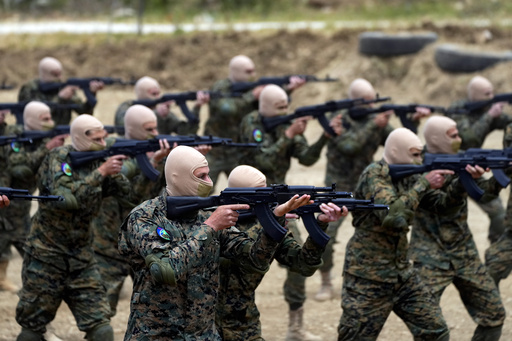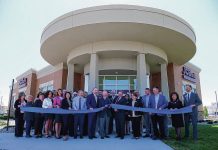Barring unforeseen circumstances, Columbus’ first permanent supportive housing complex for the homeless will be established within a few years east of Donner Park.
Victory Apartments will be a regional facility targeting homeless individuals with a substance abuse or mental health disorder, organizers say.
Besides Bartholomew, the complex also will serve residents of Brown, Decatur, Jackson, Jennings, Johnson and Shelby counties.
A purchase agreement was signed by Thrive Alliance Inc. last month to obtain the 18,696-square-foot former church at 1703 Home Ave for the housing complex. Three weeks later, members of a local supportive housing initiative completed five months of extensive training through the Indiana Supportive Housing Institute.
[sc:text-divider text-divider-title=”Story continues below gallery” ]
The initiative is a partnership between Thrive Alliance, Centerstone Behavioral Health and the city of Columbus. The training covered a wide range of cost-effective ways to help those with drug and mental health problems live more stable and productive lives, according to Rick Gardner, housing development manager with Thrive Alliance.
By completing the training, the initiative became eligible to apply for funding from the Indiana Housing and Community Development Association to create and maintain the Victory Apartments, Gardner said.
Since the group from Columbus was one of five selected statewide for the training, “there is no competition to get the funds,” Gardner said. “It’s a done deal.”
People who need a permanent housing solution, such as veterans suffering from post-traumatic stress disorder, will be selected to live in the complex, said Mark Lindenlaub, executive director of Thrive Alliance.
“This is a step in the process of moving these individuals from homelessness to self-sufficiency,” Lindenlaub said. “If someone in good standing is a tenant, they can stay there as long as they want.”
There are no plans at this time to house entire families in the complex, he said.
A process called coordinated entry will examines each potential tenant’s vulnerabilities on a number of levels to prioritize who should receive assistance first, Lindenlaub said. Several agencies will be brought in to do the examinations and make referrals, he said.
Although the partnering organizations must wait until late fall to find out how much they will receive, the funds will be earmarked to create 20 to 25 apartment units in the former church building for permanent supportive housing, Gardner said.
Currently, six beds are available for that purpose throughout a seven-county area of south central Indiana, he said. While the Victory Apartments may raise that total number to above 30, studies indicate a total of 75 beds are needed at the regional level, Gardner said.
The apartments are just one of several steps necessary in tackling significant problems such as drug addiction and mental illness, said Robin Hilber, community development programs coordinator for the city of Columbus.
“It’s very difficult to attack some of the barriers that lead to homelessness until you have them housed,” Hilber said. “Once you have them housed, you can do something.”
After a tenant moves in, Centerstone will be the key agency responsible for making sure appropriate services are provided, said James Fries, Centerstone’s manager of supportive housing.
“Our plan is to assign a case-management staff that will also provide life skills, medications, therapy and link up residents to volunteer physicians,” Fries said.
The Victory Apartments should be seen as the next step up from Brighter Days, the 36-bed emergency shelter that has operated at 421 S. Mapleton St. for the past year, Hilber said.
Although organizers say they are bracing for opposition from neighbors, Lindenlaub doubts it will be long-lasting.
“As long as they understand what we’re doing, and what the project can do, that will hopefully win some support for it,” he said.
Case studies in Vanderburgh and Monroe counties indicate permanent supportive housing results in fewer crimes, healthier neighbors, and less use of costly systems such as emergency health services, he said.
“They are getting ready to build a second building in Bloomington, and there hasn’t been much of an issue,” Lindenlaub said.
Built in 1922, the blonde brick building selected to house the Victory Apartments was home to Faith Victory Church until the congregation moved to the city’s far west side in May 2016.
Due to a variety of factors, construction and rehabilitation work near the corner of 17th and Home isn’t expected to begin until late summer or early fall of next year, Lindenlaub said.
While the purchase price won’t be released until the deal is closed, property records from March show the building is valued at $215,000.
[sc:pullout-title pullout-title=”Definition of chronic homelessness” ][sc:pullout-text-begin]
The priority population for the Victory Apartments will be those who meet the definition of chronic homelessness as defined by the U.S. Housing and Urban Development administration.
The traditional definition has been a single individual (or head of household) with a disabling condition who has either:
- Experienced homelessness for longer than a year, during which time the individual may have lived in a shelter, Safe Haven, or a place not meant for human habitation.
- Or experienced homelessness four or more times in the last three years.
Changes were made in 2015 to the definition, including:
- The four episodes of homelessness have to add up to 12 months.
- The time between periods of homelessness necessary to constitute an episode is seven days.
- Those who exited institutional care facilities after spending fewer than 90 days will have that period counted toward their homelessness.
[sc:pullout-text-end]





